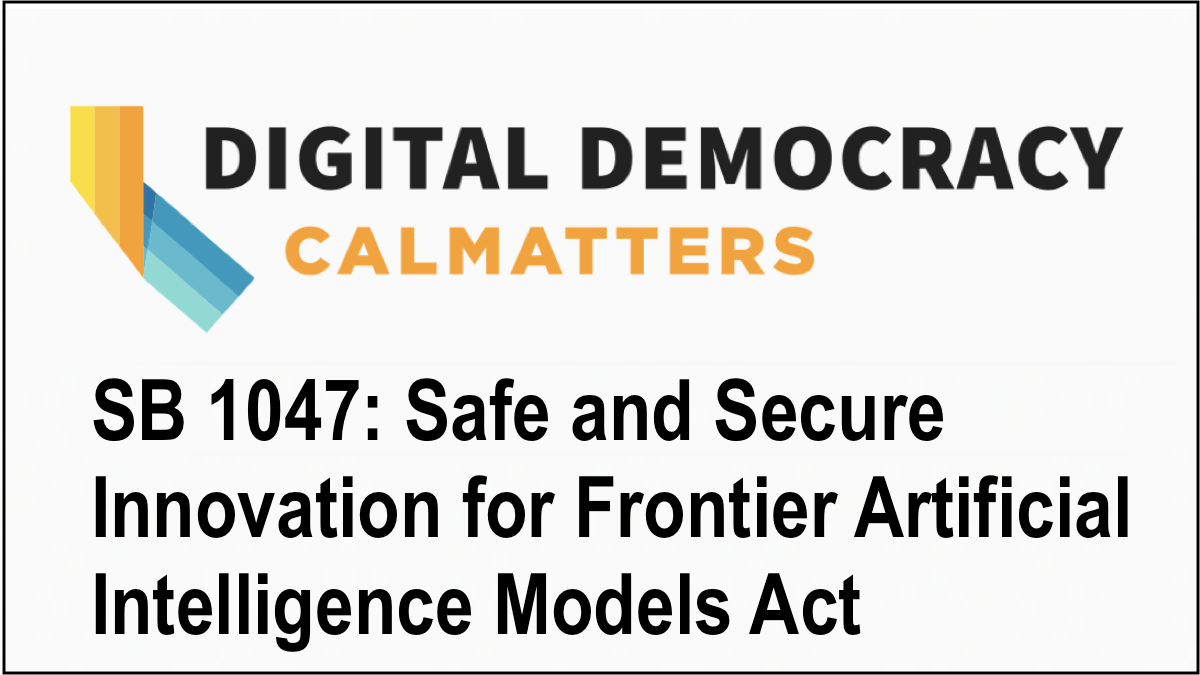DIGITAL DEMOCRACY. CALMATTERS.
Bills. SB 1047: Safe and Secure Innovation for Frontier Artificial Intelligence Models Act.
Session Year: 2023-2024.
House: Senate
Existing law requires the Secretary of Government Operations to develop a coordinated plan to, among other things, investigate the feasibility of, and obstacles to, developing standards and technologies for state departments to determine digital content provenance. For the purpose of informing that coordinated plan, existing law requires the secretary to evaluate, among other things, the impact of the proliferation of deepfakes, defined to mean audio or visual content that has been generated or manipulated by artificial intelligence that would falsely appear to be authentic or truthful and that features depictions of people appearing to say or do things they did not say or do without their consent, on state government, California-based businesses, and residents of the state.
Existing law creates the Department of Technology within the Government Operations Agency and requires the department to, among other things, identify, assess, and prioritize high-risk, critical information technology services and systems across state government for modernization, stabilization, or remediation.
This bill would enact the Safe and Secure Innovation for Frontier Artificial Intelligence Models Act to, among other things, require that a developer, before initially training a covered model, as defined, comply with various requirements, including implementing the capability to promptly enact a full shutdown, as defined, and implement a written and separate safety and security protocol, as specified. The bill would prohibit a developer from using a covered model commercially or publicly, or making a covered model or a covered model derivative available for commercial or public use, if there is an unreasonable risk that the covered model or covered model derivative can cause or enable a critical harm, as defined. The bill would require a developer, beginning January 1, 2028, to annually retain a third-party auditor to perform an independent audit of compliance with the requirements of the bill, as provided.
This bill would require a developer of a covered model to submit to the Frontier Model Division, which the bill would create within the Government Operations Agency, a certification under penalty of perjury of compliance with these provisions, as specified. By expanding the scope of the crime of perjury, this bill would impose a state-mandated local program. The bill would also require a developer of a covered model to report each artificial intelligence safety incident affecting the covered model or any covered model derivative controlled by the developer, as specified, to the Frontier Model Division.
This bill would require a person that operates a computing cluster, as defined, to implement written policies and procedures to do certain things when a customer utilizes compute resources that would be sufficient to train a covered model, including assess whether a prospective customer intends to utilize the computing cluster to train a covered model.
This bill would punish a violation of these provisions with a civil penalty, as prescribed, to be recovered by the Attorney General.
This bill would specify unlawful acts under these provisions and authorize the Attorney General or the Labor Commissioner to bring a civil action, as provided. The bill would also provide for whistleblower protections, including prohibiting a developer of a covered model or a contractor or subcontractor of the developer from preventing an employee from disclosing information, or retaliating against an employee for disclosing information, to the Attorney General or Labor Commissioner if the employee has reasonable cause to believe the developer is out of compliance with certain requirements or that the covered model poses an unreasonable risk of critical harm.
This bill would create the Board of Frontier Models within the Government Operations Agency, independent of the Department of Technology, and provide for the boards membership. The bill would also create the Frontier Model Division within the Government Operations Agency and under the direct supervision of the board, and would require the division to, among other things, review annual certification reports from developers received pursuant to these provisions and publicly release summarized findings based on those reports. The bill would require the division to, on or before January 1, 2027, and annually thereafter, issue regulations to update the definition of a covered model, as provided. The bill would authorize the division to assess related fees and would require deposit of the fees into the Frontier Model Division Programs Fund, which the bill would create. The bill would make moneys in the fund available for the purpose of these provisions only upon appropriation by the Legislature.
This bill would also require the Department of Technology to commission consultants, as prescribed, to create a public cloud computing cluster, to be known as CalCompute, with the primary focus of conducting research into the safe and secure deployment of large-scale artificial intelligence models and fostering equitable innovation that includes, among other things, a fully owned and hosted cloud platform.
The California Constitution requires the state to reimburse local agencies and school districts for certain costs mandated by the state. Statutory provisions establish procedures for making that reimbursement.
This bill would provide that no reimbursement is required by this act for a specified reason.


